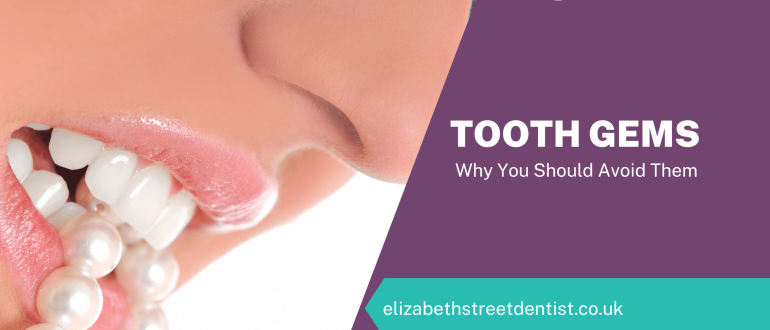
Tooth Gems – Why You Should Avoid Them
Posted by: Dr Monica Amin
Tooth gems have become extremely popular these days. Even celebrities and artists including Rihanna, Halsey, and Rita Ora have joined the dental jewellery club and can be seen sporting their tooth ornaments. But the interesting thing is that the idea of wearing dental jewellery is not new. A National Geographic report showed that tooth jewelry was not on the teeth of an adult male in a Mayan tomb, believed to be the King.
But while tooth jewels may appear extremely attractive to some, are they safe from a dental health point of view? Let’s find the answer to this question in this blog. So, read till the end whether it is a good idea to get tooth gems.
What Are Tooth Gems?
According to the Oral Health Foundation, tooth gems are crystals bonded to the teeth to increase one’s facial appeal. However, dental professionals across the world do not recommend getting any kind of jewellery on one’s teeth.
More importantly, tooth jewellery, if performed at all, should be done by a licensed dentist. The General Dental Council of the UK considers dental jewellery as a cosmetic procedure. This means that non-dental professionals who offer and perform this service are breaking the law. Therefore, although dentists do not recommended dental jewell, it should never be done by a non-licensed professional.
Are Dental Gems Safe?
There are many reasons why dentists do not recommend dental gems. The foremost is the difficulty of cleaning the teeth optimally. When one gets a tooth gem, the crystal makes cleaning difficult and can promote food impaction around it. As a result, people with dental gems are at a higher risk of developing dental complications such as tooth decay, bad breath, and gum disease.
Are Tooth Gems Bad For Your Teeth?
Tooth gems are certainly bad for our teeth. Why? Because they act as foreign objects and promote food impaction and bacterial colonization around them. These disease-causing bacteria utilise the sugars from the plaque adhering to the gems and the teeth and release toxins as by-products. These toxins cause teeth cavities and irritate the gums leading to periodontal disease.
So, no matter how well you look after your oral health while wearing tooth jewellery, you will be at a considerably higher risk of developing dental complications than those who don’t have them.
How Are Tooth Gems Applied?
There are two types of tooth gems, those applied by a professional and the do-it-yourself (DIY) ones. The professionally-applied gems are attached to the teeth using an adhesive. However, you should be very careful about what bonding material is used one’s teeth. According to the University of Utah Health, some bonding materials can be toxic and will damage the tooth leading to sensitivity or cavities.
On the other hand, the risk of dental complications with DIY tooth jewels is even higher. Why? Because most of these products use substandard glues which release toxic products that damage the teeth and gums.
Even if you use good quality and safe bonding agent, dental experts do not recommend dental jewellery due to their difficulty in maintaining optimal oral hygiene. More importantly, tooth gems protrude from the teeth and may injure the lips or cheeks.
Can You Get Tooth Gems Removed?
If you are feeling uncomfortable with your tooth gems, or if you frequently have inflammation around the gums of teeth that have gems, it is time to have your dental jewellery removed. Even if your tooth gems were not applied by a dental professional, we recommend that you contact a licensed professional to remove them. You should NEVER attempt to remove your tooth jewellery on your own.
Your dentist will remove special instruments to remove the jewellery, just like they remove dental braces from the teeth. Once they remove your gems, your dentist will thoroughly examine your teeth for cavities. They may also look at the x-ray images of the affected teeth to diagnose any underlying cavities. If your dentist detects any cavities, they will treat them with a suitable tooth-coloured filling such as composite bonding.
Furthermore, if you feel that your teeth have become sensitive after the removal of the gems, they will apply a fluoride varnish to remineralise them. In some cases, your dentist may also perform professional teeth cleaning to remove the plaque and tartar deposits from around the jewelled teeth.
How To Get Tooth Gems Removed Near Me?
Now that you know that dental jewels are not safe for your oral health, you might be thinking of where to have them removed safely in Elizabeth Street. Your best option is Elizabeth Street Dental in London.
We understand the importance of ensuring your safety and comfort in removing your dental gems. That is why, we have a team of highly qualified dental professionals who have extensive experience in performing this procedure. Moreover, we take a holistic approach to dental gem removal. In addition to removing your gems, we ensure that your teeth are free from cavities, sensitivity, or gum disease after their removal. In short, you are in safe hands with us.
Dental gems may make you look more attractive. Unfortunately, they have several oral health-related adverse effects that make them unsuitable for dental use. If you have dental gems and would like to remove them, Elizabeth Street is at your service. If you would like to know more about this procedure, we encourage you to book a free consultation. Consult with our dentists to discuss your treatment options.
- Tooth Gems – Why You Should Avoid Them - 28th January 2024
- Why Do I Have Black Lines On My Teeth? - 31st December 2023
- Invisalign®. We Answer Some Of The Most Popular Questions - 28th October 2023

